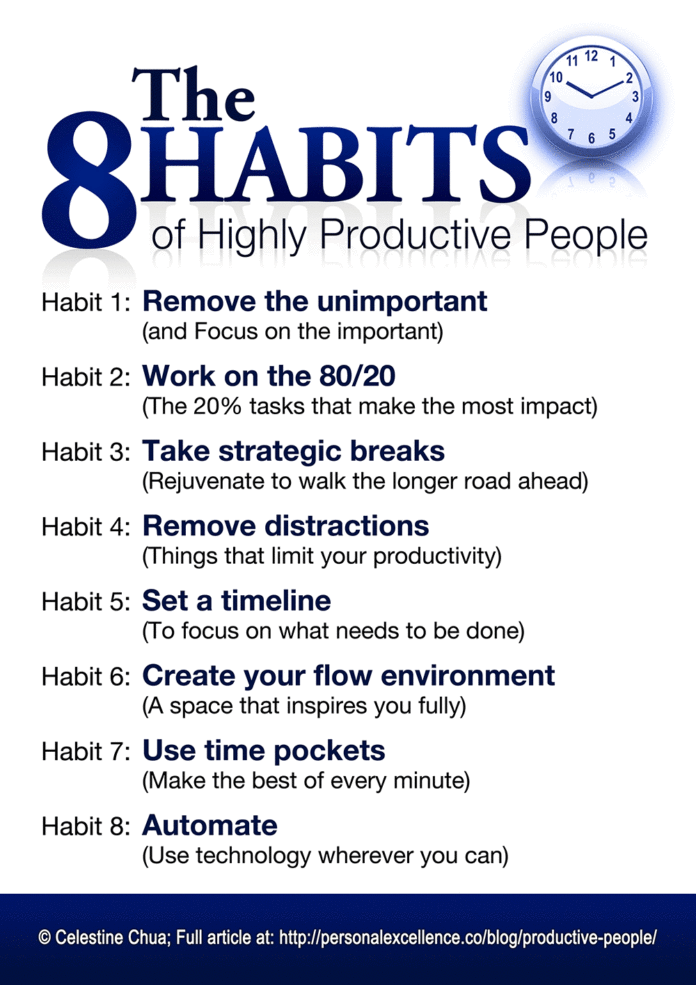Time Management Skills and Productivity PDF
Like any skill, time management takes practice. Building new behaviors doesn’t happen overnight, but if you practice these four habits, you will find that you have more time in your day to be far more productive.
List of Tips for Effective Time Management
- Stick to a Schedule. This might seem like a basic step, but it can be very effective.
- Set Expectations and Deadlines.
- Break up Work into Manageable Chunks.
- Make Lists and Prioritize.
- Eliminate Distractions.
- Discourage Multitasking.
- Reward Yourself and Others for Work Well Done.
- Use Tools and Technology.
Stick to a Schedule
This might seem like a basic step, but it can be very effective. Schedule your time each day to make sure you complete all of the work items on your list. Don’t just schedule appointments and meetings—block out time to work on specific tasks. Think about your productivity levels throughout the day and schedule around your own behaviors.
If you are more productive in the morning, make sure you have time carved out to maximize that period of high output. It may seem obvious, but it’s important to look at your schedule at the beginning of each day, before diving into an email or responding to the first question that was asked of you.
Starting your day with a clearly outlined schedule will help ensure that the tasks you have prioritized will get completed because you are not just reacting to issues as they arise.
Set Expectations and Deadlines
Entrepreneur Jason Fried, CEO of Basecamp and author of multiple books about working smarter, has said, “We like to bully deadlines. Pick on them; make fun of them; even spit on them sometimes. But what a terrible thing to do. Deadlines are actually our best friends.†When a task doesn’t have a clear deadline, it will inevitably fall to the bottom of the list in favor of items that are more urgent.
However, those ignored tasks will eventually become urgent, causing unnecessary stress and possibly impacting your quality of work if you don’t have enough time to thoughtfully complete them. When others ask you to do something, set realistic expectations about when it will be completed.
Unless it’s truly urgent, the most recent request doesn’t need to go to the top of your list. Even projects that don’t have hard external deadlines should be given clear deadlines and a plan to achieve them.
For managers, it’s important to set clear timelines with employees—and help them when necessary—so they know how to prioritize their work. Less experienced employees can also benefit from being told how long specific tasks should take because they might not yet have a sense of this.
Break up Work into Manageable Chunks
Some tasks might require a significant amount of time (or brain space) to successfully complete, but when you think of how you can fit your work into these discrete time blocks, the tasks can feel more manageable, whether you’ll complete them in 15-minute chunks or an hour at a time. Larger projects that feel overwhelming can cause you to spin your wheels, but if you break them up into smaller steps, you will be able to see constant progress.
On the other hand, smaller tasks that should only take 15 minutes can stretch out if you don’t set a cutoff time. Don’t forget to use some of the time in your day for breaks.
The Atlantic3 reported on a study that highlights the importance of taking breaks throughout the workday: “DeskTime, a productivity app that tracks employees’ computer use, peeked into its data to study the behavior of its most productive workers.
The highest-performing 10 percent tended to work for 52 consecutive minutes followed by a 17-minute break.â€
It’s important for employees to understand that being busy is not the same as being productive. Taking breaks throughout the day doesn’t mean that employees are not getting work done—it can actually make them more productive.
Make Lists and Prioritize
Writing a list of everything you need to accomplish can be intimidating. For many people, it’s a very long list and just the sight of it causes stress. However, if you organize your lists and prioritize the tasks on them, they will feel more achievable. Create multiple lists so you can focus on one area at a time.
These might include lists for home, work, and personal tasks, or project-specific lists that you can zoom in on when you are focused on that piece of work. The other common pitfall with lists is that they don’t get used.
Once you write your list, you must reference it often throughout the day to remind yourself what remains to be completed and which items are most important. When writing a list, use action words such as write, call, and review. Avoid vague words such as plan, create, or discuss.


